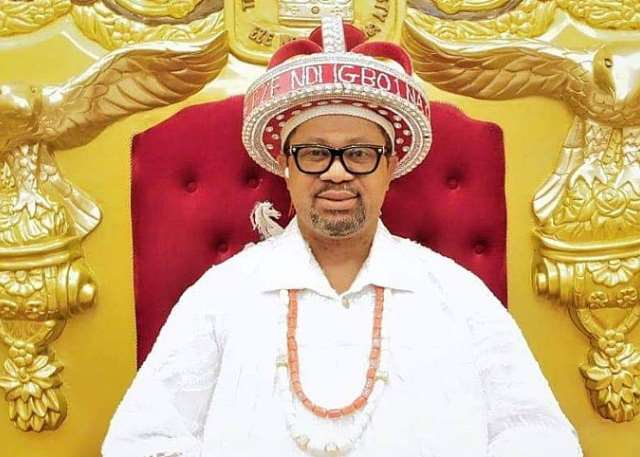|
Getting your Trinity Audio player ready...
|
A man stands before a phone camera, speaking fluently in Igbo with a steady voice and no hint of irony.
“Very soon,” he declares, “the Igbos will take over Ghana.” He said this in the Igbo dialect.
The two-minute video, which appeared on TikTok in July this year, has been widely shared across social media platforms, sparking strong reactions online.
Though the video appears to be a personal opinion with no clear context or backing, it has become the spark for a growing wave of misinformation.
The timing of the video has made it more sensitive.
It follows another widely circulated clip, also shared in July this year, showing Chukwudi Jude Ihenetu, a Nigerian national and self-proclaimed traditional Igbo leader, discussing the acquisition of land in Ghana to establish an “Igbo Kingdom.”
While the video appears part of a cultural or ceremonial event, it has been misrepresented online as evidence of an actual plan to establish an Igbo-controlled territory in Ghana.
Now, a group of TikTok accounts—@evansbenee12, @Bivans_knows, @minister_of_al_enjoyment, @rashford_65, and @daily_trend— with a combined following of more than 40,000 users, are pouring fuel on the fire.
They are not debunking the claim or clarifying the story; instead, they are churning out doctored or unrelated videos, presenting them as evidence of a Ghanaian backlash against Igbos from alleged market beatings to police crackdowns, and sending emotional and appealing messages to incite violence.
None of these videos supports the claims made in the captions. This OSINT investigation unpacks how two disconnected videos, one boastful, one ceremonial, have been exploited to manufacture an ethnic crisis that doesn’t exist.
Checking the claims
PHASE 1: Provocative Trigger Video
Claim: “The Igbos will one day take over Ghana.”
A two-minute viral video captures a man speaking in the Igbo dialect, saying Igbo people will take over Ghana.
In the first 15 seconds of the video, which DUBAWA translated, the man said, “Very soon, Igbo people in Accra will be more than the Ghanaians in population, they’re in the streets of Accra walking and speaking Igbo to themselves.” Then his last words were, “The Igbos are conquering.”
The video, which has garnered over 2800 shares as of July 18, 2025, features a voice-over from an acclaimed Nigerian stating that the true intentions of Nigerians in Ghana are to take over the country.
According to the voice, the way to maintain peace in Ghana is to go to war with the Igbos.
“So Ghanaians, you people of peaceful nature, I love it to an extent, see you can be peaceful towards yourself, but when it comes to strangers, especially towards Igbos,” the voice over said.
“I will not advise you people to give in to such peace. You know why, because for you to maintain peace, one thing is for you to have peace; another thing is for you to maintain that peace. For you to maintain peace, you must go to war.
“What this means is that the Igbo coming into Ghana, set to increase their numbers, and the purpose of their increase is to conquer Ghanaians someday, and take over Ghana,” a part of the voice says.
These statements have generated varying comments from TikTok users, some of which resonate with the video.
A user, BAAKO, said, “ Hausa’s and Yoruba’s have been with us for decades, and there hadn’t been any problem.”
Another user, Emmanuel Jarzy, said, “Ghanaians are friendly. They’re peaceful. They’re calm. But we are the first African country to gain independence. This should tell them otherwise. (We are not weak) Don’t take our calmness for granted.”
Cashlord, a TikTok user who commented on the video, said, “Nigeria will not go, because we have investment here, our children are born here, and they are born Ghanaian by birth, so stay calm.”
To investigate this claim, DUBAWA looked at the possibility of the Igbos taking over Ghana and the laws guiding immigrants from Nigeria.
While Nigerians can visit Ghana for a limited period of 90 days without a visa, those intending to extend their stay, live and work in Ghana must acquire several permits. This is by ECOWAS protocols.
Under these ECOWAS laws, Nigerians can establish a business in Ghana, provided they register with the Ghana Investment Promotion Centre (GIPC). This agency facilitates and regulates foreign investments, ensuring compliance with capital requirements before starting operations.
The claim that Igbos or Nigerians are planning to take over Ghana is not plausible. Ghana is a sovereign nation with its laws and government. These laws limit foreigners, including Nigerians, from contesting elections in the country. Also, businesses are regulated by the Ghana Investment Promotion Centre Act, 2013 (Act 865).
For the Igbos to take over Ghana, it is expected that they would have a significant Igbo demographic presence in Ghana; however, there is no evidence to support this.
In 2021, the Nigerian population in Ghana was estimated to be 77,000. Additionally, foreign migration into Ghana is strictly regulated and monitored by the Ghana Immigration Service. While ECOWAS protocols promote regional freedom of movement, they do not supersede Ghana’s sovereignty or constitutional rules.
PHASE 2: Alleged land acquisition
Claim: “I have acquired 50 acres of land in Ghana to establish my kingdom.”
Eze Jude Chukwudi Ihenetu, often referred to as the “Igbo king” in Ghana, in a three-minute video uploaded on TikTok on 7th July, claims to have acquired 50 acres of land in the Ningo area of the Greater Accra Region to establish an Igbo settlement with palaces, town halls, marketplaces, and other exclusive infrastructure.
The Minister of Foreign Affairs, Samuel Okudzeto Ablakwa, on July 16, 2025, invited Chukwudi Jude Ihenetu to address his claims of intending to establish an Igbo Kingdom in Ghana, following an alleged purchase of a tract of land.
According to the Minister, at a meeting, Izwe clarified that it was an old 2013 interview, which he deeply regrets.
Mr. Ablakwa stated that the leader of the Igbo Community in Ghana assured him that he had long abandoned the idea and had not purchased any land for that purpose.
DUBAWA investigated Eze Jude Chukwudi Ihenetu’s social media accounts to verify the authenticity of the video, which dated back as far as 2013. Through our search, we discovered an Instagram account and a YouTube account. Both accounts indeed contain a lot of footage, but neither provided any video content from 2013.
His Instagram account was created in July 2021, while his YouTube account was created in April 2020.
DUBAWA findings, however, revealed that the video in which he discusses acquiring land is indeed old. A reverse search image sends you to the video as far back as 10 months ago, but none takes you as far back as 2013.
Phase 3: Misinformation injection by TikTok accounts
Claim: “Ghanaians destroying IGBO shops, Ghanaians attacking Nigerians.”
After the viral spread of the “Igbo takeover” video and the resurfacing of the “Igbo Kingdom” land speech, several TikTok accounts began posting videos that claimed to show Ghanaians physically attacking Nigerians in retaliation.
However, a closer review of the videos reveals a different reality: many of them are either recycled from unrelated events, misattributed to Ghana, or edited to mislead viewers.
A TikTok video posted by user @minister_of_al_enjoyment with over 62,000 followers falsely implies that Nigerians are being removed from the streets of Accra by Ghanaian authorities.
The video is captioned or framed in a way that suggests a targeted xenophobic crackdown on Nigerians.
The video then leads to some reactions from TikTok users, with most believing it is an attack on Nigerians in Ghana. Some of these reactions include threats of reprisal attacks.
However, an OSINT check reveals that the footage is from a municipal decongestion exercise initiated by the Accra Metropolitan Assembly (AMA) in May 2025.
The operation aimed to remove unauthorised traders and hawkers from pedestrian pavements and roadsides, enhancing traffic flow and ensuring public safety.
There is no evidence from credible sources, local reports, or official government statements linking this operation to the removal of Nigerian nationals.
The individuals shown in the video are not identified as Nigerians, and the exercise was part of a city-wide clean-up campaign affecting all unauthorised vendors, regardless of nationality.
Another video on TikTok posted by johnstartvnews with a following of over 85,000 has a caption “Ghanaian youth protest Nigerian Igbo King’s claims in Ghana..” depicting a group of Ghanaians protesting with the police trying to control the crowd, suggesting it’s a violent demonstration targeting Igbo or Nigerian residents. This is false and misleading.
Our checks reveal that the said video involving protesters and police officers was a brief confrontation between some Ghanaian youth and police officers at Kawukudi Junction in Accra on a Friday as far back as October 2024.
It had nothing to do with Nigerians or any ethnic group.
According to verified reports, the clash happened when youth escorting the National Chief Imam’s convoy from Friday prayers became impatient after being delayed by a police barricade during a protest by a section of Ghanaians against illegal mining.
The police tried to explain the situation, but the youth forced their way through. It was a moment of traffic-related tension, not an anti-Nigerian protest.
@evansbenee in a TikTok video uploaded on his channel shows the destruction of certain shops by a group of Ghanaians. The video was captioned “Ghanaians now destroying Igbo shops.”
Our checks revealed that the video in circulation with the misleading caption is a crackdown on makeshift wooden stalls that had been illegally erected by individuals who used them to sell drugs.
Beyond the news report, the group that led the crackdown issued a disclaimer on the said video.
Another TikTok channel, under the name currency4pf8, with over 5,000 followers, has 30 videos misleading users about Ghanaians kicking out Nigerians living in Ghana. One of the videos reading “Nigeria must go now” is an old video from 5th October 2024 depicting anti-galamsey protestors clad in black and red outfits, seen chanting and singing ‘jama’ songs.
Another video embedded picture on this same channel reads “3 Nigerians killed Ghana taxi driver,” the media attached to the caption is, however, AI-generated.
There is another AI-generated video on this channel with an AI-generated character saying, “Nigerian people are taking over our country, now Nigeria must go.”
PHASE 4: Feedback Loop (False Retaliation Justification)
Claim: “Nigerian youth must defend themselves because Ghanaian youth have declared war.”
This narrative, promoted by some TikTok accounts, including the one in question, is part of a growing false justification loop.
It suggests that Nigerians in Ghana are under physical threat from Ghanaian youth, and therefore, any aggressive or defensive action taken in response is legitimate.
However, this claim lacks evidence and deliberately stokes fear and anger and threatens the existing peace between the two countries.
A TikTok channel under the name @achieverstv with over 256,000 followers in a video claims that xenophobic attacks practised in South Africa are being meted out against Nigerians living in Ghana.
Another TikToker with the name @BITTER_TRUTH_01 threatened to attack Ghanaians living in Nigeria if Ghanaians do not desist from attacking the businesses of Nigerians living in Ghana.
These retaliatory comments continue to spread in Nigeria, raising tensions. However, findings revealed that the narratives attacking Nigerians by Ghanians are often supported by misleading or unrelated content, accompanied by appealing and emotional statements.
Pan-Africanism or Panic? Expert cautions Ghanaians against online misconceptions
An international relations expert, Dr. Julius Kattah, cautioned against drawing hasty conclusions from social media narratives, emphasising the importance of legal frameworks in managing foreign presence in Ghana.
He explained that foreigners, including Nigerians, must obtain valid documentation such as work permits, residency permits, or naturalisation certificates to legally reside in Ghana.
It is essential to note that when entering someone’s country, you must obtain a work or residence permit and renew it as required. That’s a basic immigration standard,” he said.
A key issue, he noted, is that many Nigerians entering Ghana may do so informally or without adequate legal papers, which presents regulatory challenges for the Ghana Immigration Service.
However, he strongly condemned the framing of this issue as a justification for xenophobic attacks or misinformation campaigns.
“Some of them are posting old videos that seem to suggest that we are already attacking Nigerians. There are serious implications to that kind of misinformation,” he said.
Citing the Pan-Africanist ideals of regional unity, he warned against any form of hostility, stating, “there shouldn’t be an attack on any neighbouring country.”
“With the understanding of Pan-Africanism, we cannot attack our neighbours. But Pan-Africanism doesn’t mean we ignore our laws. Ghanaians must be educated to ask, Does the person living in my house have the proper documents?”
He pointed to a recent incident involving the Ghana and Nigeria Boxing Associations, where misinformation nearly sparked diplomatic friction until proper documentation proved that the Nigerian athlete in question was legally cleared.
The expert stressed that such examples demonstrate the need for both state institutions and citizens to verify facts before sharing content, especially in a volatile digital environment where old or manipulated videos can falsely justify retaliatory behaviour.
This report was published under the Dubawa Kwame KariKari Factchecking and OSINT Fellowship.









